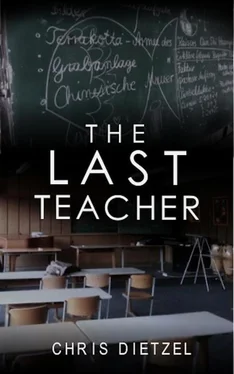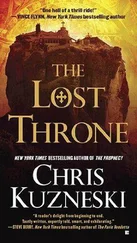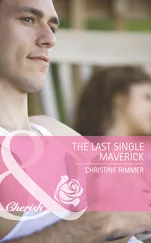Chris Dietzel
THE LAST TEACHER
A Great De-evolution Short
“Hello, class!”
None of the students said hello in return, the way they always seemed to do on television shows. Even after sixteen years of teaching, she never stopped hoping that just one time she would hear a chorus of “Hello, Ms. Phillips” in response to her cheeriness. Instead, there was silence.
Not only didn’t the children seem eager to greet her, most of them didn’t even bother to look up at their new English teacher. Gazing at students who had their faces pointed down toward their desks, she couldn’t help but wonder why they bothered to show up if they didn’t want to be there. The days of school officials tracking down delinquent children were long gone.
The few kids who did look up at her from behind their desks were the ones who actually wanted to be there, either because they enjoyed reading or because school offered a distraction from what was going on in the world. These were the kids who at least smiled at her politely when she spoke. Maybe one or two of them were conditioned to believe good grades still mattered, and they knew she would give them an A+ if they acted like they cared.
“I’m Ms. Phillips.” She pointed to her name, written on the chalkboard for the class to see, and smiled. “However, feel free to call me Ray if you like. Whichever you prefer.”
Now, every face in the room was looking at her. But the ones who had been smiling were now scratching their chins or frowning. The ones who had been more interested in the graffiti on their desks were all looking up and smirking. She waited for the question she knew was coming, the same question she got every year when she introduced herself.
“Ray?” the boy in the back corner of the room said. “Like, short for Raymond? Like, a dude’s name?”
There was always one in each class. Some things never let her down.
“No,” she said, still smiling. “Ray, like a ray of sunshine.” Then, when none of the students were put at ease by this comment or by her happy demeanor, she added, “My parents were hippies.”
One girl rubbed at her eyes. A boy looked down at his desk as if she had told them to begin reading in silence. The boy who had asked if she was named after a man chuckled and shook his head in wonder. This would be the one thing he would tell his parents about if they asked how his first day of school had been.
The only thing she could think to add was, “People used to be a lot more carefree than they are now. Before, well, you know, everything that’s going on.”
On the news that morning, the anchor woman had said the population dipped under six million people for the first time in decades. Unless scientists could find a cure for what was happening, the population would keep declining until there was no one left.
“When I call your name,” she said, “say Here . Kelly Abraham?”
“Here.”
“Zack Childers.”
“Here.”
“Farah Fran.”
“Here.”
“Stacey Klankston.”
“Here.”
“Kevin Mathiason.”
“Here.”
“Christy Neal.”
“Here.”
“Candace Nieler.”
“Here.”
“Celeste Rodriguez.”
“Here.”
“Eric Tates.”
“Yo!”
She looked up from the list of students who were assigned to her class. In the corner of the room, with his feet up on the empty chair in front of him, was the smiling face of the teenager who had asked her if her first name was short for Raymond. She could tell from how far his mouth stretched open that he thought he was the funniest person alive. There was always one kid who had to try and make things difficult.
She cringed then, but not because the class clown had identified himself so early. Only nine of the desks were occupied. Only nine students in the entire class.
Senior English, her first class of the day, was supposed to have the most students. If this was going to be her most crowded class, she didn’t want to think about how many children would be in Period 2 or the rest of the day. Having only nine kids wouldn’t have been so bad if that was the amount she had her first year as a teacher. Back then, every desk had been full. Twenty-five kids. Six classes a day. One hundred and fifty students each season. On the years when there had been budget cuts, she even needed to find extra desks from other classrooms so additional kids could squeeze in.
Not anymore, though.
Having started teaching high school English two years after the first Blocks started appearing, she had enjoyed a decade of full classrooms. Once her students were the same age as the first Blocks, however, she couldn’t help but notice the consistent decline in attendance each year. When all of the world’s new babies started being born without the ability to move, talk, or do anything at all, the writing was on the wall (on the chalkboard) that the dwindling amount of normal children in the world were the final students she would ever have. One year, there had been twenty-three kids in her class. The next year, twenty. Then eighteen. Sixteen. Twelve.
Over the summer, she and the other teachers had wondered aloud how many students they would each have when school started back up this year.
“Wanna bet on it?” Harry Rousner, the Biology teacher, said.
Not only didn’t anyone want to turn the declining high school attendance into a game, one of the older teachers, a grey-haired woman who taught Music, actually began to cry.
Now, Ray knew the answer. Nine students. With each child looking at her to say something else, she forced herself to refrain from guessing how many kids would be in her class the following year.
“Okay,” she said, taking a deep breath and smiling her most encouraging smile. “Is everyone ready to talk about the greats of classic literature?”
Eric Tates put an imaginary gun to his temple, pulled the trigger, then let his head smash against his desk with a loud thud. All the other kids giggled, even the ones who wanted her to like them.
“I’ll take that as a Yes ,” she said. “Which is good, because we have a lot to get through this year!”
Ray rubbed her eyes and said, “Why couldn’t someone come by and let us know how many students we were going to have this year? Don’t they know how discouraging it is to have twenty-five desks in your classroom and only nine students? I’d of rather moved the other desks out into the hallway or into an empty room than have my students be reminded that they’re all who’s left.”
Except for a pair of old men who were sipping their coffee, the others in the teacher’s lounge all nodded.
“Nine?” the wrinkly Music teacher, said. “Count yourself lucky. I have one kid. Petey Something-or-other. Poor kid is the only one learning about key signatures and the music scale this year. Pitiful. I have two pianos, three trombones, and an infinite supply of flutes, all for one boy.”
A whimper escaped from the woman sitting next to her.
“You know what the good thing is?” Harry Rousner said to the others sitting on the various colored sofas. “We won’t have much work to grade. I used to sit up all night trying to find ways to give kids partial credit for thinking protozoa and photosynthesis were the same thing. Now, I get done in under an hour.”
He looked around the room for someone else to agree with him. Poor Ms. Maclin, the German teacher who had already let out a slight moan, began to shake. Before anyone could ask her if she was okay, the woman excused herself, her head down and her eyes covered as she rushed out of the room. Ray watched her leave. Only later did she find out that Ms. Maclin’s class was completely empty. No one was taking German this year. No one would ever take it again at their fine institution.
Читать дальше












